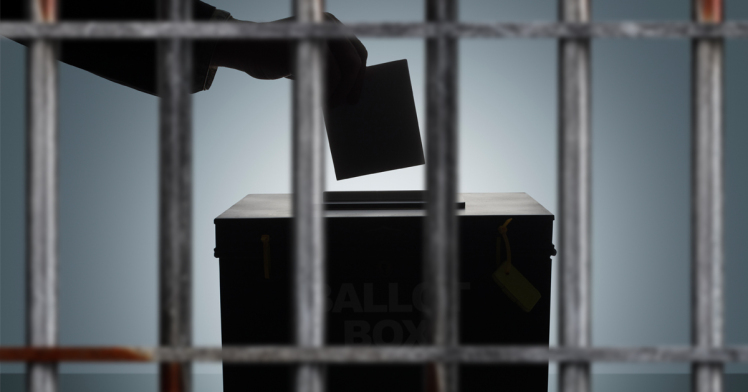UEA Student Megan Bennett argues that the lack of voting rights for prisoners in the UK is unfair, illogical, and archaic compared with other European countries. The best way to rectify the situation is to allow full enfranchisement of prisoners.
Few issues currently being debated return such polarised and emotive views as that of prisoner voting rights. When he was Prime Minister in 2010 David Cameron said that he was “physically ill” at just the thought of prisoners having a vote. How can such a stance that takes away the human and democratic rights of tens of thousands of people be justified? My argument is that it is not justified.
A Brief History
Voting in British elections has historically been a highly exclusive affair in which most people only gained enfranchisement in the 20th Century. The relatively recent suffrage movements of the past century have achieved a lot, but currently no UK prisoners have any voting rights. This can be traced back to the historical precedent of ‘civic death’ when people were sent to prison, entrenched in law in 1870 and different variations of the same exclusion have been perpetuated in Parliamentary acts ever since. In 2005 the European Court of Human Rights ruled that the UK was in violation of its responsibilities to human rights and that it had to change its policy. The issue of prisoners voting is perhaps at its most relevant right now.
The Problem with Disenfranchisement
There are many reasons why this is a significant problem for democratic and human rights. Firstly, some groups in British society are more likely than other to go to prison and therefore, be disenfranchised. Studies have shown that 26% of prisoners are from minority ethnic groups even though they make up just 14% of the general population. Over 60s in prison are part of the fastest growing age group, as prison sentences are getting longer. 30% of prisoners reported having a learning disability or difficulty. While prisoners are disenfranchised, these demographics are just some of those that are being systematically disadvantaged. Therefore, other groups are given undue advantage, such as the white, the young, or the wealthy.
Secondly, disenfranchisement treats the human rights of prisoners as something that can be taken away by the government based on a person’s behaviour. The UK has signed up to the Universal Declaration of Human Rights (UDHR) and the European Convention of Human Rights (ECHR), both of which protect every person’s right to participate in the governing of a country through periodic and genuine elections by universal and equal voting. There is no reason why someone who has committed a crime would be incapable of making a rational decision about the political and economic affairs of the UK and this is a viewpoint taken by most European countries that are similar to the UK in terms of political ideologies. Most of them allow at least some prisoners to vote. This was the basis of legal action taken against the UK by a prisoner in the European Court of Human Rights. John Hirst was imprisoned for manslaughter and kept beyond his original sentence length but still denied the vote. The ECHR found this to be in violation of Article 3 of Protocol 1 of the European Convention of Human Rights and rejected the UK’s appeal in 2005. It was left up to the government to decide on how they would fulfil the requirements of the Convention.
Policy Solutions
This brings me on to what can be done to rectify the current situation and improve democracy in the UK. The Department of Constitutional Affairs’ consultation in 2006 outlined a number of potential policies. These included enfranchising those sentenced to less than a specified term, allowing prisoners to vote depending on the crime they committed, allowing judges to decide upon enfranchisement, and finally enfranchising all tariff-expired prisoners. The response this consultation received was polarised and of members of the public who responded there were 15 who wanted full enfranchisement and 15 wanted to keep the blanket ban. This shows the divisiveness but also the fact that full enfranchisement is viable option that needs to be fully considered.
As it stands, the government has granted the vote to prisoners “on temporary release and at home under curfew” which The Guardian estimates will only enfranchise around a hundred British prisoners in total. This is not enough to be acceptable in a truly democratic society, as there are approximately 84,000 prisoners in total who cannot vote. As for the alternative suggestions made by the government, there are a number of issues associated with all of them. Enfranchisement based upon how much time a prisoner is serving may lead to perceived unfairness depending on the

timing of the sentencing in relation to the next election. This is the same as enfranchisement based upon the type of crime a person committed as both carry the same issue of setting a potentially arbitrary boundary. Allowing judges to decide on a case-by-case basis has the drawback of politicising the judiciary further and places too much trust upon their ability to be impartial and consistent. None of these options are as good as that of enfranchising all prisoners. The benefits are:
- It gives everyone equal access to their human rights under the UDHR and the ECHR.
- It complies with the international standards set out in cases such as Hirst vs. the UK.
- It does not discriminate against certain sections of society.
- It does not politicise or put undue trust in the judiciary.
It is clear that the current policy of disenfranchisement is a divisive and emotional one but ultimately it is unsustainable in the current international environment and does not work well within a modern democracy. Universal enfranchisement is the best way to solve this problem.
Megan Bennett is a third year student who took the module Elections and Electoral Malpractice
Image credit: Getty





